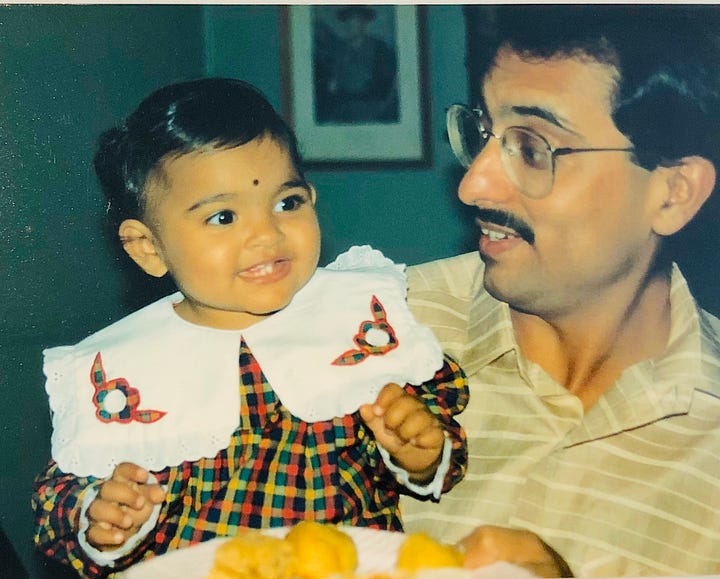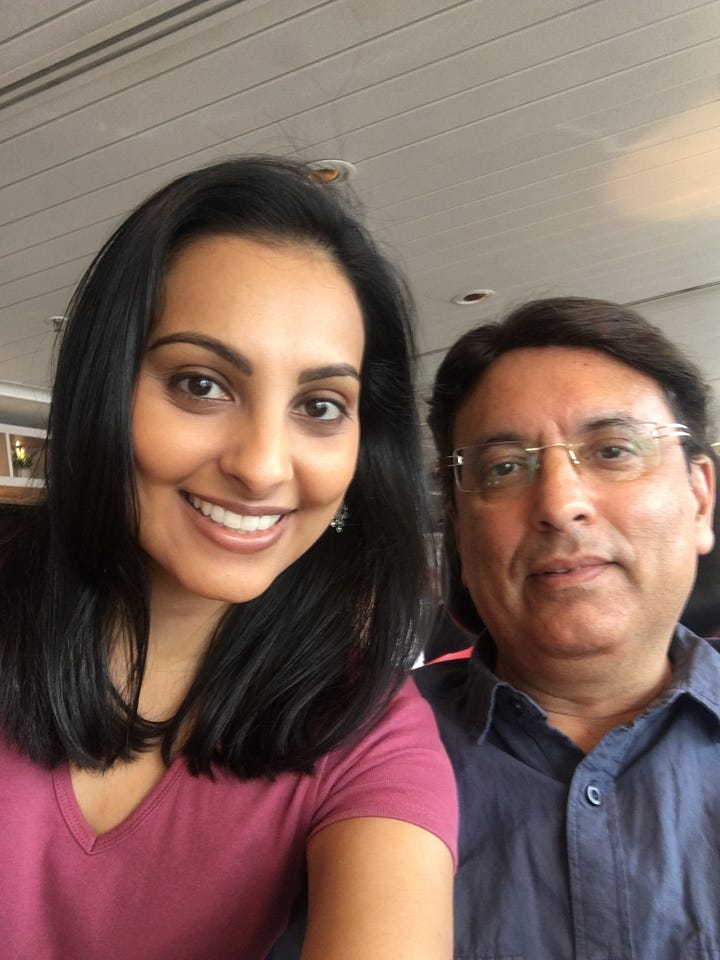#16 SEVEN things that helped me during the raw and intense early stages of grief
Number 6 might be controversial, but it was a GAME CHANGER for me.

This month’s newsletters are inspired by the upcoming anniversary of my dad’s passing at the end of January 2019. In today’s piece, I explore some of the main things that helped me navigate the early days, weeks and months of grief when the sadness, pain and isolation of losing a loved one are so overwhelming.
I’d love to hear from you! When you’re done reading, click the COMMENT button below and share your experience:
What helped you (or is helping you) in the early stages of grief?
Hi, I’m Ruhie! A writer, doctor, mum, and a daughter who lost her dad to a terminal illness.
Welcome to “From the Heart to Beyond” — a place for real-world conversations and reflections on GRIEF, HEALING & FAMILY, which I share in the form of a series of letters to my late dad, Sanjay.
Grief is universal and yet it is all-too-often avoided and widely misunderstood.
MY MISSION here is to:
🕊️ Normalise grief
🌈 Build a supportive community navigating life after loss together
✨ Share what I have learnt from losing someone I love about living with intention and making the most of the time we are given.
If you are a griever ~ If you know & want to support a griever ~ If you want to live fully & stop taking life for granted ~ If you’ve always been fascinated by life & death ~ or If you are simply interested in explorations of the human condition ➡️ THIS IS THE PLACE FOR YOU

Dear Dad,
I can’t believe it’s coming up to six years since you died. So much has happened in that time. The gap between now and when we last saw you keeps getting wider and wider; cruelly, more and more unassailable. There’s so much you’ve missed. I’ve lived lifetimes in the six years you’ve been gone.
Yet, there are times when the memories and feelings come flooding back and I’m taken right back to that when when we lost you. My body reacts viscerally like it did in the hours, days and weeks after you died. It was the worst time of my life. I look back now and sometimes wonder “How did on earth did we make it through? How did we survive?”
Everyone copes with the raw and intense early stages of grief differently. Even in the same family mourning the loss of the same person. Even when two people are grieving the loss of the same relationship.
Here are some of the things that helped me during this time. Some of them I did intentionally; others happened to me and only with hindsight can I see they were in fact coping strategies.
1️⃣ Feeling all my feelings
It sounds obvious but it’s not easy to do, because we live in a society where being vulnerable is frowned upon.
Grief is messy and complicated. There’s so many feelings.
Burying them or wishing they’d go away doesn’t work. Believe me, I tried. It’s tempting because allowing space for grief means opening yourself up to unimaginable pain.
But grief demands to be seen and heard. When we avoid it, it comes back at us harder and stronger, commanding our attention until we have no choice but to give in and feel its full force.
Denial and avoidance delay, prolong and intensify grief.
I’ve learnt that the only way to approach grief is head on, giving ourselves permission to feel all of it unapologetically.
2️⃣ Talking about you
Some people find it too painful to talk about their person soon after they die, and that’s absolutely okay. But for many others, we WANT to talk about them. We NEED to debrief and share our experience with others, so it doesn’t sit so heavy on our hearts and minds.
It is normal and okay to want to talk about someone we’ve loved and lost. It helps us feel closer to them. It is how we process grief.
You are NOT being “annoying” by bringing them up in conversations. You are NOT too much. You are NOT a “downer”. Don’t allow yourself to be silenced by other people’s discomfort.
Talking about those we’ve loved and lost is our way of keeping their memory alive now that they’re gone.
3️⃣ Looking at photos & videos of you
For those of us left behind after death, this is all we have left of them. A way to see and hear them again. The ONLY way we can anymore. So it makes sense that we want to spend every moment we can scrolling through all our photos and videos of them.
Although, yes, it was deeply confronting being faced with the you that was alive and so full of life in photos and videos, versus the cold harsh reality of your absence, it was worth it just to relive those moments when you were still here.


4️⃣ Support from others
Grief is incredibly isolating. The crater-sized hole that they leave in your life feels like a void that can never be replaced. You feel distant from others, through no fault of their own, because they’re not going through exactly what you are.
However, the right support from the right people can be an invaluable source of comfort and strength. It helps us feel seen and less alone in our sadness.
The most meaningful ways of supporting someone who’s grieving include:
Validating their feelings
Allowing space to talk about the person they lost
Not avoiding the topic or changing the subject because it’s too uncomfortable
Checking in regularly
Showing up consistently
Help with practical tasks
Just being there
Support often comes from family and friends. In our case, we are fortunate to have an incredible network who rallied around us after you died. I remember being surrounded by loved ones in those early days and weeks. Our house was always full. We were taken care of. We felt loved. While in no way did this take away the pain of losing you, we never felt alone in our grief.
Sometimes, support can come in ways and from people who surprise you. I had folks reach out to me who I never expected and who I came to rely on in the early stages of grief. And sometimes, sadly, the people you assumed would be there for you let you down. Talk to anyone who’s experienced grief and I have no doubt they’ll say something similar. I learnt to be grateful for whatever helpful support I received, and try to let go of the rest.
Support can also come from people you didn’t know before and perhaps connected with over your shared experience of grief, such as bereavement support groups, online communities and professional services like a therapist or grief counsellor. There is a lot of evidence to suggest that early use of these services can help people navigate acute grief and discover their own path towards healing.
5️⃣ My son
Our eldest was just six months old when you died. Without even knowing it, this little ray of sunshine helped me through those early days, weeks and months when grief is intense and all-consuming.
At the time, my mind and body were so ravaged by grief that all I wanted to do was wallow. Yet, here was this living, breathing, smiling entity that demanded my time, energy, love and devotion; that literally depended on me for his survival.
Whenever I felt my grief spiralling out of control, Az would force me out of it.
He gave me a reason to get up in the morning and push through the day.
His baby routine kept me anchored when my sense of time felt utterly warped.
He brought joy where there was only pain.
He made me laugh when my heart was broken.
He made me be silly and fun when I felt like crying.
He brought light and love to our family in a time of unimaginable darkness.
Kids have a way of making us live in the present and be in the moment. I didn’t realise it at the time, but in hindsight I can see how he grounded me in a way I so desperately needed and for which I am endlessly grateful.

6️⃣ Not forcing self-care
Don’t get me wrong! There is copious and irrefutable evidence for the benefits of self-care practices like exercise, eating well, meditation and journalling in dealing with life’s challenges.
I’m not saying these things aren’t helpful. They absolutely are. But there is a time and place for them.
When you’ve just lost someone you love, it’s hard to work up the energy to get out of bed and face the day let alone engage in self-care.
So if it takes you some time before you feel ready to start implementing these self-care practices, that’s okay. You’re not doing anything wrong. You will get there in your own time.
7️⃣ Taking it one day at a time
Grief can’t be rushed. It doesn’t follow a timeline.
It took me a while to figure that out. You might go two steps forward one day and ten steps back the next. That’s okay. That’s normal. That is grief.
So if you’re wondering “what’s wrong with me?”, “why aren’t I over it?” or “I thought I was getting better!” like I often did in those early stages of grief — please give yourself grace. You’ve been through something HUGE and life-changing. Allow yourself the time and space you need to process your loss and begin to heal.
It’s not a race. There is no finish line. Take it one day at a time. Hour by hour, minute by minute, moment to moment. Until slowly, ever-so-slowly, light starts shining in, colour returns to your life, and you begin to feel your heart open again.
Miss you every day, Dad. Love you always. Until next time 💌
Ruhie
Thanks so much for reading today’s letter 🙏🏼🫶🏽
I’d love to hear from you! When you’re done reading, click the COMMENT button below and share your experience:
What helped you (or is helping you) in the early stages of grief?
Thank you for being here and supporting my work. I am truly grateful!
If you got value from this and you think others might too, please:
Click the HEART button 💟 and leave me a COMMENT 💬
SUBSCRIBE for free to “From the Heart to Beyond”
SHARE my newsletter with someone you think would appreciate it
And don’t forget to
🌈 Live Fully
💛 Love Deeply
😁 Laugh Often
⏳ Make the most of the time we are given




I think I still deal with loss by avoiding or not thinking about them. I do this with your dad and my papa.
Still to this day when I think about them I feel pain.
Talking about them helps but then I can’t help but think we’ll never see them again.
Your points are very valid.
Support from others is very important. It’s nice to have friends who check up on you and those who are considerate and choose yo include you in their activities.
Funny memories are always helpful so talking about them does make you laugh.
In time self care definitely helps.